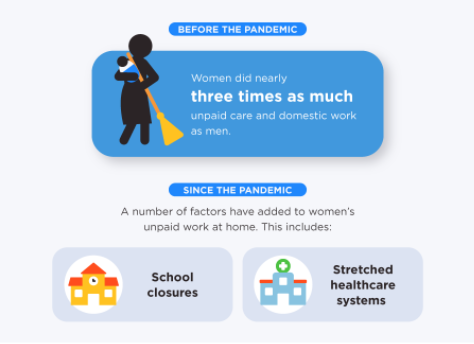The Pandemic Pushes Back Women’s Rights
This year has been a difficult one—people have lost their loved ones, their jobs, and their sanity. Amongst these terrible things is the impact it has had on women and girls across the world. Because of the pandemic, there has been a drastic increase in the number of women who have gone unemployed in order to take care of their children at home. Surprisingly, this is also a popular trend in America, a “progressive” and somewhat wealthy country. Besides this, education for women in low-income countries has been put on hold.
Women and girls across the world who have children or siblings, or simply assumed the role of housewife or caretaker, have quit their jobs or their schooling. According to americanprogress.org, the child care sector, which has already noticeably seen a lack of support for families over the years, has 4.5 million child care slots that have the potential to be lost permanently. “The risk of mothers leaving the labor force and reducing work hours in order to assume caretaking responsibilities amounts to $64.5 billion per year in lost wages and economic activity,” according to this report.
Even in this age where women are on the verge of getting equal pay and equal opportunities to men, women across the world are still being pressured to quit their jobs in order to be the sole caretaker for their children. The American Progress even reported that “four times as many women as men dropped out of the labor force in September, roughly 865,000 women compared with 216,000 men.”
Despite the progression, many have seen in the women’s rights movement across primarily developed countries like America, even before the pandemic, women are not receiving equal compensation to male counterparts. Globally, women make up 70% of health workers and first responders but are still not earning the same as their males in their field, according to UNWomen.org. Before the pandemic, women also spent about 4.1 hours/day doing unpaid work, while men only spent 1.7 hours (UNWomen.org). Unpaid work mainly means chores around the house, taking care of children, etc. As of now, UNWomen.org reports that the “pandemic will push 96 million people into extreme poverty by 2021, 47 million of whom are women and girls. This will bring the total number of women and girls living on USD 1.90 or less, to 435 million.”
In order to resolve these issues, UN Women suggests that governments and businesses provide direct income support to women, support for women-owned businesses, women employers, informal workers, and reconciliation of paid and unpaid work. In general, the pandemic has pushed the women’s rights movements back by years. Women, today and in the past, have every right to work and earn a living at the same salaries as men.
Sources:
Your donation will support the student journalists of Parkland High School. Your contribution will allow us to purchase equipment and cover our annual website hosting and printing costs.






